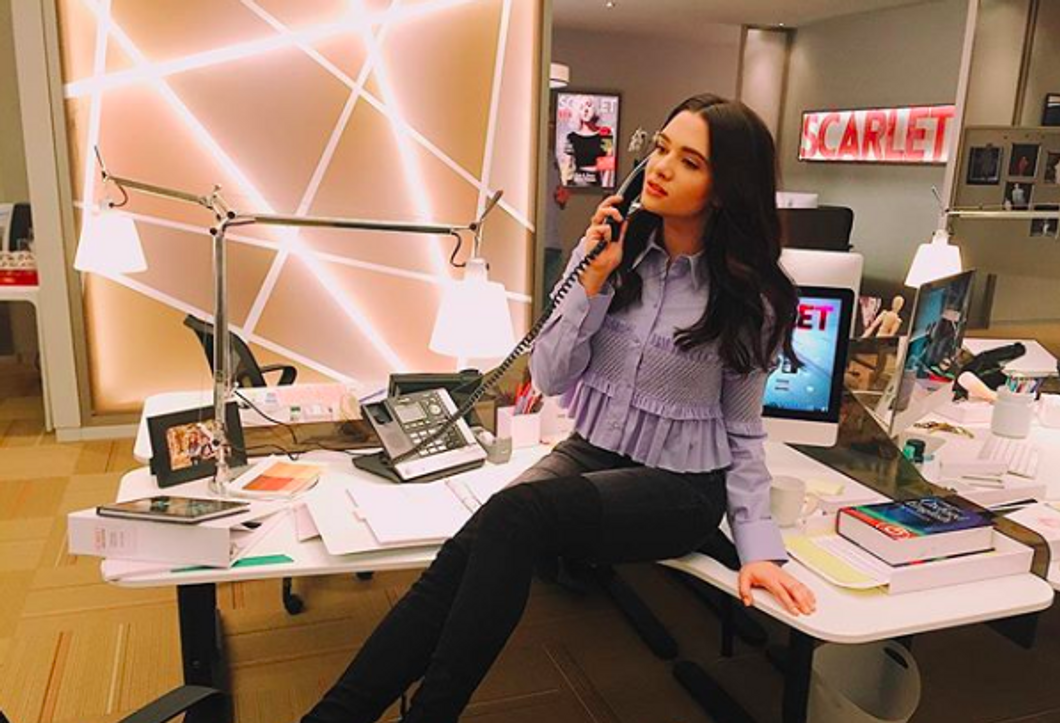Recently, I have been fascinated by the Freeform show "The Bold Type" and had a difficult time restraining myself from binging all the episodes available on Hulu. Not only does this show have a "feel-good" vibe, but it covers relevant issues throughout the episodes without taking away from the show itself. The friendship that Jane (Katie Stevens), Kat (Aisha Dee), and Sutton (Meghann Fahy) have is something special and would be a dream to have in the workplace in my own future. Additionally, each of their jobs (writing, social media, and fashion) are all ones that don't necessarily get legitimate attention or portrayal in many forms of media, but I feel that "The Bold Type" gives a realistic image to these professions while still being entertaining and essential to the plot of the show.
From watching this show the past couple of weeks, I have personally connected with Jane's character (which is probably not a surprise to many who know me and have seen the show). I've been relating to Jane through a lot of the episodes and, since catching up on seasons one and two on Hulu, I decided to make of list of things I learned about writing from Jane's experiences while I wait to start watching season three! I love learning from other writers, knowing about their challenges or lessons they value and remember when they write, so I thought I'd share what I've taken away from "The Bold Type" with all the other writers who may read this. Whether you're a fellow content creator on Odyssey or you write for fun or you're in a writing profession, these pieces of advice can relate to all of us and are always helpful to remember!
We all experience some kind of "writer's block."
Do what you got to do to find that inspiration. That could mean leaving the city you're in for a day, waiting for the stress of the deadline to inspire you, or discussing your topic with friends or a mentor to help you find a new angle.
Nothing stops a deadline.
Get the writing done. That could mean you get it out fast or you submit it last minute—either way it gets written.
Writing is isolating, so find a place where it doesn't always feel that way.
Go to a coffee shop. Have a writing buddy. Find a workplace you love. Maybe freelance isn't for you. Share your work!
Always portray both sides to every story.
As the writer, you should have the broadest understanding and knowledge about your subject. Especially if it's controversial and you don't necessarily agree with one view, you still have to give it the respect it deserves and right a thought-provoking piece that doesn't display one-sided bias.
Don't let anyone manipulate your story.
You, as the writer, control the intent of your story. Don't let an editor or friend or potential reader edit or mold or influence your story to be something that it's not.
The story always matters most—not the bylines or awards.
"One voice can inspire others. One voice can start a movement." - Jane Sloan (Katie Stevens) in The Bold Type, Season 2, Episode 6.
We don't always feel inspired or get the pitch/idea we want, but that doesn't make the other story any less worthy of being written.
One week you may feel inspired to write a personal and moving piece while another day you may end up having to write a quiz. It is what you make of it.
As writers, we crave structure.
Freelancing can be fun and freeing, but it's also lonely, difficult, and lacks the structure and deadlines we crave.
Editors can be your best friend, your mentor, and confidant.
Jane Sloan's editor, Jacqueline Carlyle, in The Bold Type is everything I hope to have in a boss one day.
You can always dig deeper into the story even when you think it's too painful.
Embrace the emotions and personality in a story. Specifically, when a story is so personal, that gives you all the more reason to get it done well.
Sometimes we need to take chances with our work and challenge ourselves.
Even if it's a risk and may not work out in the end, as writers we need to explore outside our comfort zones whether that is the type of pieces we are writing or the place we're writing in or for. Our safe place may not always be the safest place for our writing at that time in our lives.
Every story needs a different level of attention and care.
We all need to figure out how to recognize this in a story and act upon it.
Some stories are better left unwritten.
It may be a good story, but the effects on the people in it may be far graver than it's worth.
If you can't connect with a story, do whatever you have to do to understand it before writing about it.
Don't write about something you don't know about or can't sympathize with or can't understand. These pieces could end up turning into rants instead of insightful perspectives on an issue.
Everything's better with friends.
Whether that's working with your friends or having a fellow writer to call up at any moment.
Always look for a new angle.
Most writers know the saying "No story is unique. It's been done before just in a different context." So make sure your story doesn't waste people's time. Put a new spin on the issue or topic, so that it intrigues your readers. Find a new or interesting perspective that will enlighten your readers.
Ask the hard questions.
Ask them of your story, to the people you may be interviewing, to yourself as a writer. Ask them to be able to grow your story into something new and something that pushes expectations and what's been done before.

















